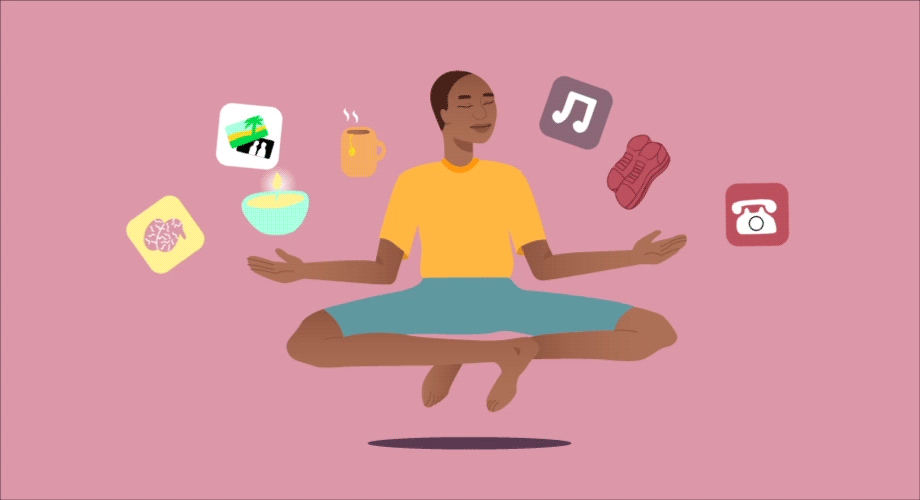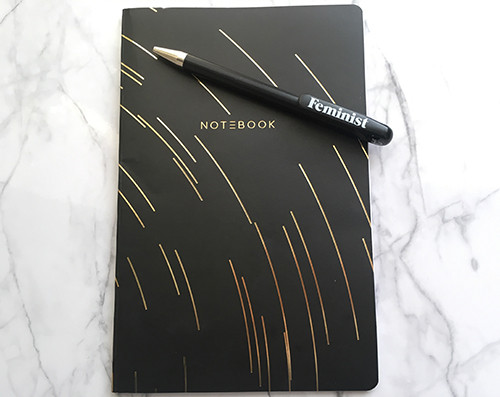Blog Series
My Mental Health Routine

Illustration by Mallory Taylor
If you spend your nights falling down the YouTube rabbit hole like I do, you might be familiar with the popular video trend of morning routines. You know, those videos where the person sets up their camera equipment, presses record, hurries back to their bed, “wakes up”, and then goes through their seemingly perfect day. Don’t get me wrong, I enjoy and find inspiration from these videos, and I only wish I could wake up at 7am, have an aesthetically pleasing breakfast, go to a yoga class, and be in bed by 9pm - but that’s just not the case, and spoiler alert that’s okay. I’ve come to realize that trying to perfect my days with a rigid schedule is not realistic for me and my needs. For me, anxiety symptoms like to have a surprise visit within my life, which doesn’t always make it easy to plan how my day will go. In fact, planning for certain things causes even more anxiety, which is a main reason why living spontaneously on a day-to-day basis relieves some of that pressure for me.
However, being too erratic and not having some stability within my day does not serve me well, either. Finding the perfect balance that won’t overbear me with commitment, while still keeping my anxiety controllable, has become key to my everyday life, and this has consequently helped me form my mental health routine. Having a routine that supports my mental health ultimately helps the outcome of my day be a positive one. It’s important to remember that mental health is just as important as physical health, and therefore needs to be cared for just as you would with living a healthy lifestyle.
Routines, in fact, can act as an aid in benefiting your mental health and there is research to prove it. A study published in The Lancet Psychiatry concluded that those who have a daytime routine have a healthier sleep cycle, which ultimately contributes to better mental health, as opposed to an interrupted sleep cycle that can cause emotional and mental health difficulties. For some folks, planning out every hour can help to ensure there is enough time in the day to do various tasks - sleep included. Sleep is very important for our mental health and although I don’t “schedule” it within my mental health routine, I make sure I am doing a bunch of winding-down activities before bedtime, which I will list below.
1. MEDITATION
Meditation is something I like to incorporate into my day-to-day life as much as possible. Meditation can come in many forms and can be very personalized for you and your life. For me, starting with a five-minute meditation session in the morning is how I like to start my day to ensure I am in the right mindset. You know the saying “breakfast is the most important meal of the day”, well, meditation is the most important activity of the day in my opinion. Sometimes I use a meditation app, such as Headspace or Unplug and other times I like to spend the five minutes in complete silence while practicing gratitude. Taking that time out of my morning allows me to release any energy from the previous day and start new.
2. JOURNALING Journaling is how I like to keep track of how I’m feeling. Sometimes I will write the thoughts and emotions I experienced in my day, and other times I’ll talk about my overall week. Like meditation, journaling can be very personalized. Sometimes I write with a physical pen and paper, while other times I use the notes app on my phone. When I was growing up, I went through at least three diaries a month (not because I used all of the paper, but more so because I would buy every cute design I could find), and as I got older and matured, this stopped. As my interests changed, I realized I didn’t have to buy every cute design I saw at a store, and frankly, due to my busy schedule in high school and the beginning of University, I didn’t see the importance of writing in a journal like I once did because I thought it took too much time and wouldn’t really help me. I have to wonder if my younger self was onto something though because now at this stage of my life, which is a lot older than I was when I bought all of those diaries, I have realized that writing has become such a therapeutic activity for me. Taking the time to be self-reflective has greatly impacted my mental health because it allows me to face the thoughts in my head that I think many of us tend to put aside and decide not to tackle, which can be for a variety of reasons. I used to just repress any intrusive thought or feeling because of the distress it caused and instead use distraction as my single coping mechanism. Although now in my life distraction can be helpful at times, the most important thing has been addressing my thoughts and feelings first because if I kept pushing them aside, I wouldn’t be able to learn about myself and grow. Addressing the feelings you are experiencing is a key way of understanding what healthy coping mechanisms can work for you, instead of just assuming something will be beneficial or not. Now at twenty-three years old, I may not buy every cute notebook design I find (or else my wallet would hurt), but that same energy I once had growing up, has reignited and I have the motivation to write because I’ve seen its positive impact in my life.
We all have thoughts going through our head, some of which can cause distress, but writing them down is such a release. Getting it out into the universe, even if I crumble up the paper or backspace until it’s like I never wrote it, helps me to get it out of my head. Journaling and writing, in whatever form that may be (poetry, fictional writing, etc.), is an integral part of my day and something I like to end my day with. A tip - leave your journal (or whatever you may use) within easy access to where you sleep, that way before you go to sleep, you can get into the habit of writing and it won’t feel like a chore.

Photo of the author’s journal
3. MAKING TIME FOR “ME” TIME Life can get beyond busy and putting personal needs first is not always possible at times. That is why I ensure that no matter what happens in my day, I am doing something that I enjoy - usually it’s watching a television show. I don’t necessarily have a set time, but I know that when I watch a show (say on Netflix), I am not thinking of anything else. Taking that break, whether it be throughout the day or in one lump of time, is key in making sure I’m not feeling overwhelmed, which just increases my anxiety symptoms.
I personally like to make this time when I have nothing else to do in the day, that way it’s more like a reward. However, when I used to study for exams, for instance, I used Netflix as a reward for every couple of chapters I would read; whatever it takes to get you through it! Keeping things customizable and ensuring you’re not comparing what you “should” like, to what others like, is an important step in making sure you will receive maximum benefits during this time - you get to choose what you want to do!
4. BEING ONE WITH NATURE Walking outside, such as at a park or a nature trail, is a new activity that I like to incorporate within my day. Being outside and breathing the fresh air, weather permitting of course, has significantly improved my mental health. Taking the time to be outside, while being aware of what is around me, and not being distracted by texts or social media notifications, has allowed me to designate that time to total relaxation. I now try and do things that I would normally do inside, outside. For example, instead of reading a book at home, doing it outside makes it that much more enjoyable.
Findings have shown that being in nature boost the immune system by breathing in the natural chemicals that plants give off, reduce stress and lower cortisol levels (a hormone related to stress), improve mood, increase the ability to focus, increase energy level, improve sleep, and so many other amazing qualities. With so many benefits, it’s no wonder frolicking though nature has helped me in such a significant way. Having a designated space to relax is a must in my day when things around me can be overwhelming. Choose a spot that’s right for you!

Photo taken by author on a walk
5. BRAIN GAMES Keeping the mind sharp through games that are flooding the App Store is an easy way to stay on top of your mental health. I personally like using Peak, an app that personalizes various “brain games” that touch on a variety of areas. According to Peak, “the brain is like a muscle and it can change over time, responding to what we do with it”. Within the Peak app, memory, mental agility, problem solving, focus, language, and emotion skills, are some of the areas that can strengthen when engaging in these types of games. There are numerous other apps similar in content to Peak that can also be very beneficial, so trying out other apps can help gauge what elements work best for you and your style of learning and brain training. Think of it as a workout routine for your brain and personalize it to your needs!
I personally like to keep busy and distracted when my anxiety symptoms are high, which is why playing a game that also helps in achieving optimal brain health is my top choice. If apps are not your top choice, games and activities that most of us are probably familiar with, like chess, the crossword or Sudoku, can also be great options. Training my brain and working it out like a muscle is key within my mental health routine and by doing this every day I watch my progress rise, which is a great motivator.
TO ROUTINE, OR NOT TO ROUTINE The best thing about a routine is that you can shape it to whatever way works best for you. Not having a set schedule to follow but ensuring I’m incorporating the above tasks has helped me to live more in the moment and take better care of my mental health. I believe having various times throughout the day to relax and take time for self-reflection has helped to minimize the severity of my anxiety symptoms. Although my day-to-day schedule changes, I like to keep the above tasks constant, while of course incorporating other small things that bring me positivity - such as my morning (and afternoon) coffee.
Whatever you choose to incorporate into your daily routine, keeping in mind your mental health will be extremely beneficial to your overall health. Even keeping just one daily ritual and building it up from there is a great way to slowly make your way to a full (or semi-full) routine if that’s what makes sense in your life.
The biggest thing I like to remember is to not compare what I’m doing in my day to someone else. It’s easy to think that we need to do more or be more productive because that’s what we see our friends doing, but if that doesn’t make sense for you, then don’t fall into that trap. Find the things that you like to do and that benefit your mental health and incorporate them into your daily life.
Let Shameless know what your must-have activities are in your day!



